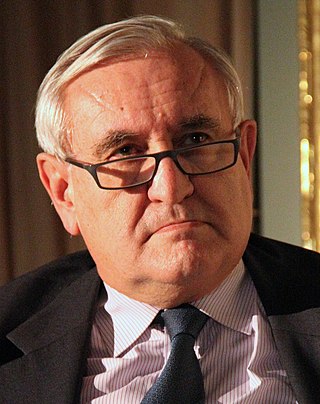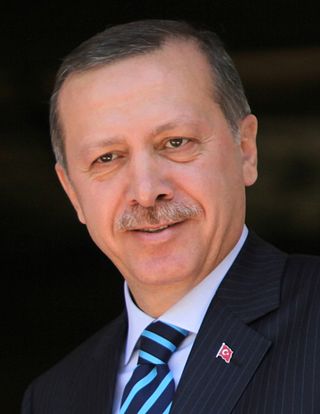Related Research Articles

The politics of Trinidad and Tobago function within the framework of a unitary state regulated by a parliamentary democracy modelled on that of the United Kingdom of Great Britain and Northern Ireland, from which the country gained its independence in 1962. Under the 1976 republican Constitution, the monarch was replaced as head of state by a President chosen by an electoral college composed of the members of the bicameral Parliament, consisting of the Senate and the House of Representatives.

Jean-Pierre Raffarin is a French politician who served as Prime Minister of France from 6 May 2002 to 31 May 2005.

The ministries of Poland are the various departments performing functions implemented by the Polish government. Each ministry is headed by a governmental minister selected by the Prime Minister, who sits in the collective executive Council of Ministers. The current competences and regulations of the ministries were established under a series of central administrative reforms carried out by prime ministers Józef Oleksy and Włodzimierz Cimoszewicz between 1996 and 1997. Under legal regulations, the cabinet can create, combine, or dissolve ministries, with the Prime Minister determining the scope and responsibilities of ministers. The number and range of ministries has varied throughout the past.

The Ministries of Japan or Government Agencies of Japan are the most influential part of the executive branch of the Government of Japan. Each ministry is headed by a Minister of State appointed by the Prime Minister. In postwar politics, the posts of ministers have been given to senior legislators, mostly of the LDP. However, few ministers serve for more than one or two years to develop the necessary grasp of the organisation to become really influential. Thus, most of the power lies within the ministries, with the senior bureaucrats.
The Cabinet of Malaysia is the executive branch of the Government of Malaysia. Led by the Prime Minister, the cabinet is a council of ministers who are accountable collectively to the Parliament. According to the Article 43 of the Federal Constitution, members of the Cabinet can only be selected from members of either houses of Parliament. Formally, the Yang di-Pertuan Agong appoints all Ministers on the advice of the Prime Minister. The constitution is amended by repealing the Clause (8) of Article 43, enabling a person who is a member of State Legislative Assembly to continue to serve even while serving as a minister or deputy minister in the cabinet. Ministers other than the Prime Minister shall hold office during the pleasure of the Yang di-Pertuan Agong, unless the appointment of any Minister shall have been revoked by the Yang di-Pertuan Agong on the advice of the Prime Minister but any Minister may resign from office. In practice, the Yang di-Pertuan Agong is obliged to follow the advice of the Prime Minister on the appointment and dismissal of ministers.

The Cabinet of Dominica is appointed by the President of Dominica acting in accordance with the advice of the Prime Minister of Dominica.

Tillman Joseph Thomas, CBE is a Grenadian politician who served as Prime Minister of Grenada from 2008 to 2013. He was the leader of the National Democratic Congress (NDC) from 2000 to 2014.

The First Filat Cabinet was the Cabinet of Moldova between September 25, 2009, and January 14, 2011. It was a caretaker cabinet from the election of November 28, 2010, until it was succeeded by the Second Filat Cabinet on January 14, 2011.

The Cabinet of Namibia is an appointed body that was established by Chapter 6 of the Constitution of Namibia. It is mandated to include the following positions: the President of Namibia, the Prime Minister of Namibia and any positions that the President so appoints.

The Second Filat Cabinet was the Cabinet of Moldova from 14 January 2011 to 30 May 2013. The Cabinet consisted of ministers from the Liberal Democratic Party of Moldova, the Democratic Party of Moldova, and the Liberal Party, who together formed the Alliance for European Integration. It was the second government to be led by Vlad Filat who was prime minister from 2009 until 2013. The Cabinet was installed after a successful vote of confidence held in the Parliament of Moldova on 14 January 2011.

The third cabinet of Recep Tayyip Erdogan was the government of Turkey from 2011 to 2014, during the 24th parliamentary term of the Grand National Assembly of Turkey. The cabinet succeeded the second Erdoğan cabinet following the 2011 Election.

Dmitry Medvedev's First Cabinet was a cabinet of the government of the Russian Federation following the 2012 Russian presidential election that resulted in the election of Vladimir Putin as the fourth President of Russia.

The second Government of Prime Minister Edi Rama was the 66th ruling Government of the Republic of Albania which was officially mandated by the President on 13 September 2017. Following the 2017 election, the Socialist Party won a majority of seats to Parliament and had the right to form the government without the need of a coalition.

The Prime Minister of the Democratic Republic of the Congo Sama Lukonde was appointed on 15 February 2021. He announced his first cabinet on 12 April 2021. On 24 March 2023, a second cabinet was announced.

The second government of Hussein Arnous was formed after appointment by the President of Syria on 10 August 2021 and took the oath of office on 14 August 2021, after the presidential election held in May. This replaced the caretaker ministry formed in July. The government is the 95th since Syria gained independence from the Ottoman Empire in 1918 and is the eighth during the presidency of Bashar al-Assad.

The Cabinet of the Democratic Republic of the Congo is chaired by the Prime Minister of the Democratic Republic of the Congo.

15th Government of Slovenia was formed by Robert Golob following the 2022 Slovenian parliamentary election. Robert Golob, leader of the Freedom Movement, was nominated as Prime Minister, and was approved as such on 25 May. The government has the largest number of ministries after the 1st Government of Slovenia.
References
- ↑ Today, The New (2022-06-30). "The new Grenada cabinet". The New Today. Retrieved 2022-08-10.
- ↑ "New Grenada Cabinet named". www.nationnews.com. 2022-07-01. Retrieved 2022-08-10.